Trading Day: Stocks take hit from Covid outbreak, QBE woes
ASX falls sharply as travel and bank stocks feel impact of Sydney Covid cluster, while A2 Milk slashes guidance and Mesoblast dives.

- AGL outage to cut power
- Travel stocks feel Covid heat
- Mesoblast sinks on trial setback
- Viva forecasts FY loss
That’s all from the Trading Day blog for Friday, December 18. Australian shares were rocked by Sydney’s worsening COVID outbreak after a strong run up in the past two months. This was even after Wall Street set new records on stimulus bets. The Dow added 0.5 per cent, the S&P 500 climbed 0.6 per cent and the Nasdaq gained 0.8 per cent. National Australia Bank held its AGM.
Perry Williams 7.13pm: Boral to sell Meridian Brick business
New Boral chief Zlatko Todorcevski has pushed ahead with the overhaul of the building materials supplier with the joint sale of its North American-based Meridian Brick venture to Austria’s Wienerberger for $US250m ($329m).
This equates to $US125 million for Boral’s 50 per cent share, with the balance owned by a unit of private equity play Lone Star Funds.
Boral expects a small pre-tax accounting profit on sale of approximately $10m at closing.
Mr Todorcevski said the divestment of Meridian Brick represents the final step in Boral’s exit from brick operations globally.
“In recent years Boral has divested its interest in bricks in Australia and since forming the bricks joint venture in the US with Lone Star in 2016, the plan was to ultimately prepare the business for sale,” he said in a statement.
“As part of this process, Meridian’s leadership was refreshed with the appointment of a new CEO in December 2018, and a stronger focus on improving performance. “
The agreed sale represents a fair value for the business and reflects its improved performance, he said.
“The divestment of Meridian is a further step in Boral’s portfolio review works. It helps to streamline our US business and allows us to further focus on the improvement initiatives underway in the remaining businesses in Boral North America.
In August Boral made more than $1.2bn of non-cash writedowns mostly due to its North America operations and its investment in the Meridian Brick joint venture.
Under previously chief executive Mike Kane, Boral expanded into North America with the acquisition of fly ash and construction material company Headwaters in a deal worth $3.5b. It followed up by establishing the Meridian joint brickmaking business with US firm Fonterra brick that same year.
Revenue from the US division has been hit hard by the COVID-19 pandemic, falling 5 per cent in the four months to April on the back of reduced stone, roofing and fly ash production volumes.
The sale comes as US lawfirm Bragar Eagel & Squire is investigating a potential class action against Boral on behalf of Boral stockholders.
The potential legal action centres Boral disclosing in February that it had found inflated earnings at its North American window-making business, forcing it to fire the division’s vice president of finance and financial controller.
“Our investigation concerns whether Boral has violated the federal securities laws and/or engaged in other unlawful business practices,” Bragar Eagel & Squire said in a statement.
Perry Williams 4.47pm: Tomago ali smelter cries foul on power prices
Australia’s biggest aluminium smelter has criticised the huge spike in wholesale power prices that have forced the facility offline for the fifteenth time since November, the most on record.
Tomago Aluminium - the nation’s largest power user whose owners include Rio Tinto and CSR - receives its power from AGL Energy whose Liddell plant suffered a serious accident on Thursday, crippling output from the coal station.
The Liddell outage contributed to a massive jump in wholesale power prices to $15,000 a megawatt hour on Thursday afternoon and forced the national power operator to find emergency supplies to ensure the lights stayed on.
That price spike also allowed AGL to reduce supplies to Tomago as part of its contract, meaning the smelter cut one potline at 5.30pm on Thursday and another an hour later, saving 300MW each time.
However, big price moves at a time when demand has not been particularly high was concerning, according to Tomago Aluminium.
“The price volatility we are seeing has us extremely nervous going into the heart of summer,” Tomago chief executive Matt Howell told The Australian.
At least five NSW coal units are currently offline, hiking pressure on the grid. AGL only has half of its Liddell and Bayswater coal plants operating while one of EnergyAustralia’s Mt Piper units is also offline, consultancy WattClarity said.
Wind and solar output also crashed on Thursday.
4.27pm: ASX ends -1.2% at 2-day low
Australian shares were rocked by Sydney’s worsening COVID outbreak after a strong run up in the past two months. In its biggest one-day fall so far this month, the benchmark S&P/ASX 200 index tumbled 81.12 points, or 1.2 per cent, to 6675.5 points, shedding $25bn of market capitalisation as states including QLD, VIC and WA imposed varying degrees of travel restrictions on NSW residents in response to the growing threat of a coronavirus outbreak in Sydney’s Northern Beaches.
Qantas dived 3.5 per cent, Sydney Airport lost 2.9 per cent and Flight Centre fell 2.7 per cent.
Ampol fell 4.7 per cent and Viva Energy lost 4 amid concern about the impact on fuel demand.
Economically-sensitive stocks including banks and property trusts were caught up in the selloff with National Australia Bank down 2 per cent and Stockland down 4.3 per cent.
Profit warnings also weighed on the local bourse with QBE Insurance down almost 13 per cent after flagging an adjusted net cash loss of $780m for its fiscal 2020 year and A2 Milk down 24 per cent after earning that its fiscal 2021 revenue will be about 20 per cent less than previously advised. Mesoblast cratered 36 per cent after a trial of its remestemcel-L drug for COVID patients with moderate-to-severe acute respiratory distress syndrome failed to achieve its primary goal.
Perry Williams 3.36pm: Risks to the national power grid rising
Risks to the national power grid have grown from an outage at AGL Energy’s Liddell coal plant although the broader outlook for reliable supply over summer remains unchanged, the Australian Energy Market Operator says.
A transformer incident on Thursday will put one of Liddell’s four turbines out of action potentially until the end of summer, cutting 420 megawatts of the plant’s overall 1680MW capacity.
“While AGL continues to assess the extent of the outage, AEMO will work through and manage any possible impacts associated with the unit’s outage, as we do for all incidents of this nature,” AEMO said in a statement.
“While any unplanned outage elevates risk, despite this event, AEMO’s outlook for reliability over summer is unchanged.”
AEMO, which runs the power grid, said in late November conditions for summer were looking favourable with a big jump in renewable capacity available, an expected reduction in maximum demand and generator outages expected to be completed before Christmas.
2.35pm: Shares continue to slip; ASX -0.9%
Australia’s share market continues to edge down, pointing to a weak close.
The S&P/ASX 200 fell 0.9pc to an intraday low of 6695.6.
The next likely support level on the chart is this week’s low at 6625.7.
Financials are weakest with QBE down 12pc on a profit warning.
But the Real Estate, Energy and Tech sectors are also underperforming the index.
A2 Milk is the second-biggest points detractor, down 22pc after its profit warning today.
1.34pm: Synlait pauses after A2 Milk guidance cut
Synlait Milk shares have paused trading, shortly after “strategic customer” A2 Milk cut its revenue and earnings guidance for full year 2021.
12.47pm: A2 Milk slashes guidance, shares dive
A2 Milk has cut its revenue and earnings guidance for full year 2021, sending its shares down 20 per cent in New Zealand trade, on track for their biggest one-day fall in two and a half years.
Blaming a worse-than-anticipated decline in surrogate-shopping sales to Chinese consumers, it now sees FY21 revenue of $NZ1.4bn - $NZ1.55bn versus $NZ1.8bn - $NZ1.9bn as of September 28.
That’s a 20pc downgrade at the midpoints.
It also sees a FY21 EBITDA margin of 25 per cent - 29 per cent versus 31pc back in September.
The margin downgrade translates to 350 basis points based on the midpoint of the new guidance range.
“The effect of the disruption in the daigou channel, which represents a significant proportion of our infant nutrition sales in our ANZ business, has proved to be more significant and protracted than was previously anticipated,” A2 Milk warns.
“While this has predominantly affected infant nutrition sales, sales in our other nutritionals segment have now also been impacted.”

12.33pm: ASX to rise 13pc in 2021: UBS
UBS analyst Pieter Stoltz tips a 13pc rise in Australia’s S&P/ASX 200 share index to 7600 points in 2021.
His price target assumes 15pc EPS growth and a price-to-earnings ratio valuation de-rating from 19.5 to 19.0 times.
Upside risks include more stimulus and resources upgrades, given near-record high Australian dollar iron ore prices.
While a COVID resurgence could increase volatility, the main downside risks are a delay in the rollout of vaccines, domestically or globally, and if rising bond yields drag on valuations, he says.
“Valuations across the Australian market are at near record highs, with the ASX200 trading at a 19.5 times PE, while the valuation of the Industrials ex-Financials is at a record high 30.6 times,” Mr Stoltz notes.
“However, we argue a combination of low real rates and a likely rebound in earnings and dividends means equity markets can continue to move higher.
“Australia’s higher weighting to cyclical sectors also means Australia could play catch up through 2021 and outperform global equities after underperforming 12 per cent since COVID.”
His base case for the Australian economy in 2021 sees a COVID vaccine rollout start in the first half of 2020, which supports a recovering labour market, alongside a strong housing market, despite tapering stimulus.
“Signposts continue to improve, leading us to be more positive on a 2021 economic recovery,” Mr Stoltz says.
He favours cyclicals over defensives, value over growth, and small over large companies.
“These trades are likely to peak during the vaccine roll out toward the end of 2021, in our view.”
Perry Williams 11.59am: AGL’s Liddell ‘dangerous’
A major incident at AGL Energy’s Liddell plant shows the coal facility is dangerous after a half century of operating, according to energy adviser Simon Holmes a Court.
“A transformer blew up at #liddell yesterday seriously hurting a worker. The 50-year-old power station, like multiple others, is way past its design life and is dangerous. Thankfully it has already been mostly replaced by new generation,” he wrote on Twitter.
AGL now faces a decision on the level of investment to ensure Liddell can keep operating until the 2022/23 summer, he noted.
“Hazelwood was closed down when Engie determined that required $400m safety upgrades were unlikely to be recouped. Will be interesting to see how many $millions AGL invest in keeping liddell running. Keep an eye on yallourn in victoria. similarly fragile/dangerous.”
A transformer incident on Thursday will put one of the four Liddell turbines out of action, cutting 420 megawatts of the plant’s overall 1680MW capacity.
âš ï¸ a transformer blew up at #liddell yesterday seriously hurting a worker.
— 💧simon holmes à court 🩠(@simonahac) December 18, 2020
the ~50 year old power station, like multiple others, is way past its design life and is dangerous.
thankfully it has already been mostly replaced by new generation. pic.twitter.com/DaRY12p0OK
11.47am: ASX tumbles 0.8pc after Covid outbreak
Australia’s share market has fallen sharply in response to the COVID outbreak on Sydney’s northern beaches
The S&P/ASX 200 fell as much as 54 points or 0.8pc to an intraday low of 6701.1 points, after overnight futures signalled a flat start.
The Financials sector was weakest with QBE down 8.5pc on a profit warning. Banks are also under fire from the COVID outbreak, with NAB down 1.8pc.
The Technology sector was almost as weak, with sector heavyweight, Afterpay, down 3.7pc amid profit-taking before its inclusion in the ASX20 and ASX50 indexes at the close today.
Large cap air-travel related stocks weighed on the Industrials sector, with Qantas down 5.4pc and Sydney Airport off 2.8pc.
Among smaller travel-related stocks, Webjet lost 6.3pc Flight Centre fell 4pc and Corporate Travel fell 3pc.
The outbreak also hit the Energy sector as fuel retailers Ampol and Viva Energy dived 7.6pc and 3pc respectively.
Mesoblast was worst off with a 36pc fall after a setback to its COVID ARDS drug trial.
The S&P/ASX 200 was last down 0.7pc at 6708.
11.24am: Mesoblast sinks on trial setback
Stem cell-focused Mesoblast is emerging as one of the ASX’s most volatile stocks, with its shares down as much as 45 per cent on Friday amid some disappointment around its Covid ARDS trials.
Shares clawed back some lost ground but in late morning trade were still down 31 per cent at $2.59, its lowest point since the end of April.
Mesoblast initially had some positive reaction to its drug Remestemcel-L, which had helped patients with serious COVID-19 complications recover because it was targeting acute respiratory distress syndrome (ARDS).
In a statement, Mesoblast said the US Data Safety Monitoring Board performed a third interim analysis on the trial’s first 180 patients.
The trial was powered to achieve a primary endpoint of 43 per cent reduction in mortality at 30 days for treatment with remestemcel-L on top of maximal care in a trial of 300 patients.
The DSMB reported that while there were no safety concerns “the trial is not likely to meet the 30-day mortality reduction endpoint at the planned 300 patient enrolment”.
The DSMB recommended that the trial complete with the currently enrolled 223 patients, and that all be followed up as planned
Mesoblast noted that during the course of the trial and as the pandemic has evolved, numerous changes in the treatment regimens for COVID-19 patients had occurred, including both prior to and while on mechanical ventilation, that may have an effect on the mortality endpoint in the trial.
“These include extended management of patients prior to ventilator support, and use of experimental therapies such as dexamethasone, anti-virals, and re-purposed immunomodulatory agents. All of these may have changed the natural course of ventilated patients and reduced overall mortality rates during the trial compared to the early stages of the pandemic,” Mesoblast said.
11.15am: NSW Covid cluster grows
NSW Premier Gladys Berejiklian says 10 additional cases of COVID-19 have been linked to the Sydney northern beaches outbreak, bringing the cluster to 28.
She said all but one case has been linked with the cluster, and that one of the cases travelled to Queensland.
However the 10 new cases recorded in NSW today compares to 17 a day earlier.
The Greater Sydney area has been placed on “high alert”.
The S&P/ASX 200 has extended its fall by 3 points to an intraday low of 6717.1.
The index was last down 0.6pc at 6717.1.
10.48am: Travel stocks feel COVID heat
Australian travel stocks are feeling the heat of travel restrictions following the COVID outbreak on Sydney’s northern beaches.
Webjet fell 3.9pc, Qantas lost 3.1pc, Corporate Travel tumbled 2.6pc and Flight Centre was off 2.3pc.
This puts them among the worst 20 performing stocks in the S&P/ASX 200 today.
Fuel stocks are also getting hit with Ampol down 2.1pc and Viva Energy is down 3.4pc.
10.46am: Desert Metals more than doubles on debut
The share market may have headwinds today but the IPOs are still going strong.
Desert Metals shares opened at $0.48, more than doubling on the IPO price of $0.20.
Perry Williams 10.30am: AGL outage to cut power
The Australian power grid will face its first test of the summer after AGL Energy’s Liddell coal plant in NSW suffered a major accident that will cut electricity output until early March.
A transformer incident on Thursday will put one of the four Liddell turbines out of action, cutting 420 megawatts of the plant’s overall 1680MW capacity.
The outage may also pile pressure on the national power grid at a peak time of summer, raising concerns over the level of supplies when demand spikes during hot weather.
A worker was seriously injured and the unit was taken out of service on Thursday, with an investigation underway over the cause of the incident.
“AGL is currently assessing the length of any outage that may occur at Liddell Unit 3 as a result of the transformer incident. On a precautionary basis, AGL has informed the Australian Energy Market Operator that the length of the outage may be up to two and a half months, subject to the completion of this assessment. AGL notes that this estimate is highly preliminary,” AGL said in a statement.
AGL will divulge the financial impact of the outage no later than December 23.
The 50 year-old Liddell plant is due to shut in the 2022-23 summer with its capacity replaced by a mix of gas, battery and renewable projects through the state.
The Australian Energy Market Operator, which runs the power grid, said in late November conditions for summer were looking favourable with a big jump in renewable capacity added from the previous year, an expected reduction in maximum demand, and current generator outages expected to be completed before Christmas.
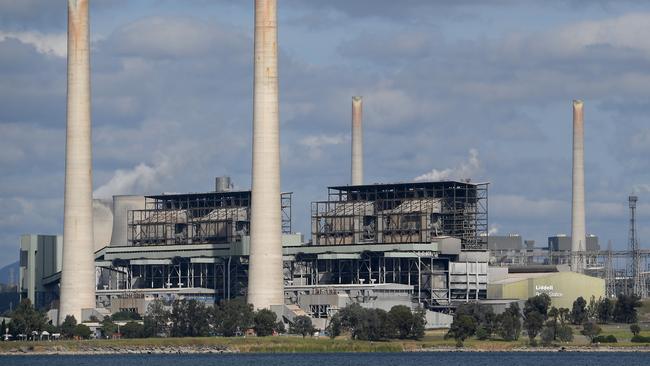
10.26am: ASX sinks at open amid QBE, travel woes
Australia’s share market fell relatively sharply as QBE dived on a profit warning, travel stocks including Qantas were hit by travel restrictions after a COVID outbreak on Sydney’s north shore, and Mesoblast was decimated by a weak COVID ARDS trial result.
The S&P/ASX 200 fell 0.5pc to an intraday low of 6720.8, with an 8.3pc fall in QBE wiping four points off the index, while Qantas fell 3.3pc and Mesoblast crashed 40pc.
Major banks have also weighed on the index after recent gains, with NAB down 1.3pc despite its AGM indication that dividends would restart at a higher rate.
ADBRI was hit by a rating downgrade from Jefferies and price target cut from Citi, falling 6.4pc
Iron ore miners are bucking the selloff with Fortescue Metals up 1.8pc.
10.18am: Italian bank granted local licence
One of Italy’s largest banks, Intesa Sanpaolo, has been awarded a banking licence from Australian bank regulator APRA.
The Italian bank, with a market capitalisation of more than $60bn, offers retail, corporate, and wealth management in its home market.
The bank has 14.6m customers and offers commercial banking in 12 countries in central Europe and the Middle East. It has corporate customers across 26 countries, in particular in the Middle East and North Africa and in those areas where Italian companies are active, including the US, Brazil, Russia, India and China.
Perry Williams 10.12am: Culture a priority for new Rio boss
Rio Tinto’s incoming CEO Jakob Stausholm is expected to have an immediate focus on changing the miner’s corporate culture and repairing damage from the Juukan Gorge destruction, BMO analysts said.
“We do not expect an immediate change in Rio Tinto’s corporate strategy, but we do anticipate a transformation in corporate culture over time,” BMO said.
The promotion of Mr Stausholm to the top job from his CFO position surprised the market, with many expecting an external appointment and possibly an Australian citizen to soothe concerns over the Juukan Gorge fallout.
However, the Danish national is regarded as a “cool-headed” choice to reset the company, albeit only being in the Rio CFO role for the last two years.
“We think Mr Stausholm is an excellent, cool-headed and sensible appointment, albeit unexpected as most observers were expecting an Australian appointee,” BMO analyst Edward Sterck said.
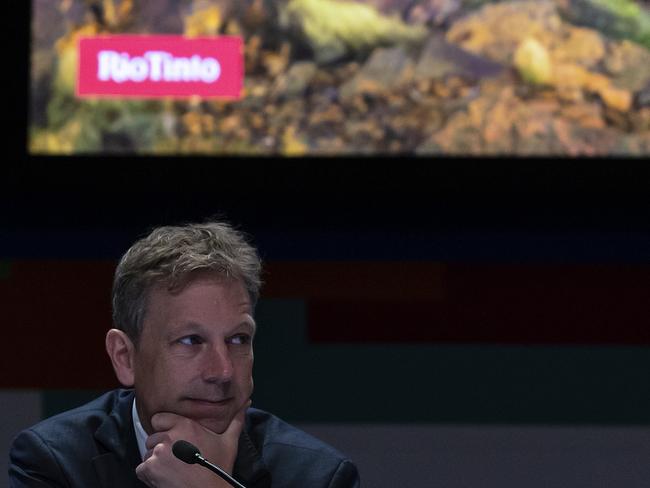
His priorities include fixing cultural heritage issues stemming from the Juukan Gorge disaster in Western Australia’s Pilbara. At an operational level, Rio must push into green commodities, assess its aluminium position and also its Simandou iron ore project in Guinea.
“In our view, the new CEO’s priority is to rebuild Rio Tinto’s reputation and ESG credentials with its stakeholders, which have been severely damaged by the Juukan Gorge incident,” Mr Sterck said.
“On the strategic front, the focus is likely to be on increasing exposure to ‘green’ commodities including copper and lithium, asset rationalisation of the aluminium segment, and the long-term optionality of Simandou which we expect will reduce the CO2 impact of Rio Tinto’s overall iron ore product offering.”
10.09am: Mesoblast Covid ARDS trial falters
Mesoblast’s trial of remestemcel-L in ventilator-dependent patients with moderate to severe acute respiratory distress syndrome appears to have faltered.
It’s not likely to achieve its primary endpoint of a 43pc reduction in mortality after 30-day of treatment.
The trial involving 223 patients will continue for 60 days.
Richard Gluyas 10.03am: NAB to lift payouts ‘when it’s right to do so’
NAB chief executive Ross McEwan has told shareholders at the bank’s annual meeting that NAB is a dividend-paying stock “and we will resume paying at higher levels when it’s right to do so”.
Mr McEwan said while “revenue headwinds” from low credit growth and ultra-low interest rates remain, he sees opportunities for growth in NAB’s core banking businesses.
“As we lift performance, we expect to have the opportunity to return more profit to you, our shareholders.”
He also set out the target of achieving double-digit cash return on equity “as a key measure of our success”.
Mr McEwan also says the Australian and New Zealand economies “are clearly on the road to recovery”, with GDP rising by 3.3 per cent in the September quarter, driven by a strong rebound in consumer spending.
“We now think the economy will be back to 2019 growth levels by the end of 2021. That’s about a year earlier than we previously thought.”
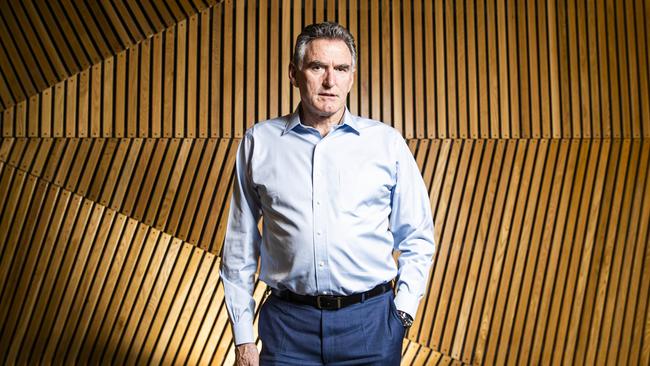
Ben Wilmot 10.00am: Stockland in Queensland expansion
Diversified property group Stockland is backing the recovery of the housing market and has bought a 700 hectare land estate in Queensland’s Ripley Valley in a $193m deal.
The company said the move further restocked its residential pipeline with a new trading project and it is structured with payments over six years.
The “Providence” estate is located 43 kilometres south-west of the Brisbane CBD and 12 kilometres west of the Greater Springfield CBD.
The estate will have more than 20,000 people over the next 20 years including an education precinct, sports ground and a town centre. More than 1500 residential lots, two schools, sporting facilities, a café, and sales and community centre have already been delivered. Another 6,000 new homes are in planning.
“We expect the record-low interest rates to continue to underpin the residential market over the medium term, and this acquisition aligns with our strategy to restock our development pipeline with well located, market-ready projects in areas with strong demand fundamentals and expected total returns above our hurdle rates,” Stockland chief executive of communities, Andrew Whitson said.
9.55am: What’s impressing analysts?
Adbri cut to Underperform: Jefferies
Adbri target price raised 13pc to $3.50: Neutral rating kept: Citi
Mineral Resources started at Buy; $41.90 target price: UBS
Nickel Mines started at Outperform: $1.35 target price: CS
Peninsula Energy restarted at Speculative Buy: Canaccord
Scentre Group raised to Buy: Jefferies
Service Stream cut to Sell: Bell Potter
Service Stream cut to Neutral: Macquarie
Telix Pharma started at New Speculative Buy: Evans & Partners
Zip Co cut to Sector Perform: RBC
Doctor Care Anywhere started at Buy; $1.95 target price: Bell Potter
9.45am: ASX may keep rising, after US records
Australia’s share market may rise Friday after bigger than expected gains on Wall Street.
Overnight futures point to a flat open for the S&P/ASX 200 index.
But the S&P 500 rose 0.5pc to a record high of 3030.3, exceeding a 0.3pc rise indicated by futures.
Share markets are trending up strongly, it’s normally a strong time of year for shares and the 10pc rise in November is a positive sign for the coming months.
On the charts, support may now be at 6745 and there’s minimal resistance until 6900.
A COVID outbreak on Sydney’s north shore has led to a stay-at-home appeal in the area and some interstate travel restrictions, which may hit travel-related stocks.
However provided this latest outbreak remains small and containable it won’t have a major impact on economic activity.
Meanwhile US lawmakers have indicated that agreement on a $US900bn fiscal stimulus is imminent, with Republican Senate leader McConnell saying a deal is “close at hand”.
Higher-than-expected weekly US jobless claims and record new US COVID infections and deaths should motivate US lawmakers to reach agreement.
Brexit discussions continue with EU Commission President Von der Leyen saying substantial progress has been achieved in many issues, albeit big differences remain.
Solid gains in commodity prices will help with spot iron ore up 1.1pc to $US158.70 a tonne, WTI crude up 11.2pc to $US48.40 a barrel, spot gold up 1.1pc to $US1885.55 and LME copper up 1.1pc.
Dividends will also tend to flow back into Australian shares this month with Bell Potter’s Richard Coppleson estimating $8.5bn in cash will be paid (including from DRPs) from December 10-22nd.
The S&P 500 rebalance and inclusion of Tesla at the close today may cause US share market volatility in coming days.
The S&P/ASX 200 rose 1.1pc to a 10-month high of 6756.7 on Thursday.
9.20am: Westpac ends BT deal with IOOF
Westpac says it’s concluded its 10-year shared master relationship agreement with IOOF, as it simplifies its business arrangements.
Westpac and IOOF have been working towards the agreement “while supporting IOOF
advisers and clients to transition to the market leading BT Panorama platform”.
“This follows Westpac’s first successful client migration from BT Wrap to Panorama earlier this month.:
Westpac will pay IOOF a one-off amount of $80 million.
9.05am: Viva Energy forecasts underlying net loss
Viva Energy Group has forecast an underlying net loss in the 2020 fiscal year as it grapples with weak refining margins and the impact of the coronavirus pandemic on demand.
Viva Energy said it expected to report an underlying net loss of between $17m and $47m in the 12 months through December.
That forecast is measured on a replacement cost-of-sales basis, which strips out the impact of movements in oil prices by restating the cost of sales using the replacement cost of goods sold.
Underlying earnings before interest, tax, depreciation and amortization is projected by Viva Energy to be $494m - $524m. That would represent a 21 per cent drop at the mid-point of the guidance range compared to the $644.5m reported in fiscal 2019.
“Retail sales volumes are progressively recovering towards pre COVID-19 levels with our key Alliance retail channel achieving 61.7 litres per week in November 2020,” said chief executive Scott Wyatt.

Dow Jones Newswires
8.35am: QBE flags $US1.5bn FY loss
QBE Insurance Group expects to report a statutory net loss of $US$1.5 billion in the 2020 fiscal year, but says its balance sheet remains strong and sufficient to fund growth plans.
The general insurer on Friday said that it was also guiding for a $US780 million adjusted net cash loss for fiscal 2020. This forecast includes $US470 million of COVID-19 costs, $US130 million of elevated catastrophe costs and $US360 million of prior accident year claims development.
Still, annual net investment income is expected to be $140 million, which QBE says is a material turnaround from a loss of $90 million in its fiscal first half.
“While I am very disappointed with the headline statutory loss, I am increasingly confident about the pricing cycle, particularly in the northern hemisphere, and the outlook for the underlying business,” interim chief executive Richard Pryce said.
QBE will deliver its full year result on February 19.
Dow Jones Newswires
8.05am: US stocks close at records on stimulus optimism
US stocks rose to record levels as lawmakers closed in on a deal to extend a new financial lifeline to businesses and individuals that could support the economy through the coronavirus pandemic’s deadliest phase.
All three major stock benchmarks hit closing records after notching intraday highs in morning trading. The Dow Jones Industrial Average added 148 points, or 0.5 per cent, to 30301, as of the close of trading. The S&P 500 climbed 0.6 per cent to 3722, while the Nasdaq Composite gained 0.8 per cent to 12764, both records.
Negotiations continued on a roughly $US900 billion coronavirus relief deal that includes another round of direct payments to households. After months of gridlock, the emerging agreement represented a breakthrough at a critical time in the pandemic. Vaccine distribution is under way but hospitalizations are hitting record highs.
Lawmakers initially hoped to approve the relief bill alongside a broad government spending package before current government funding expires just after midnight on Saturday. But Congressional leaders are now considering passing a stopgap spending measure to give themselves more time to wrap up negotiations on the bill, extending the timeline for approval.
Investors broadly think a new dose of stimulus is necessary to gird the economy until the end of winter and widespread vaccinations have the potential to bring the virus under control in 2021. Rising cases appear to have hit consumer sentiment, weighing on retail sales. There are also new business restrictions in some states.
“The stimulus is key,” said Mary Nicola, a portfolio manager at PineBridge Investments.
Labor-market data on Thursday added to evidence that the economy has hit a speed bump. Initial claims for unemployment benefits rose by 23,000 to 885,000 in the week ended Dec. 12. Economists had been expecting a small decline.
“Any stimulus is good stimulus at this point, especially when you’re coming through a rough patch,” Ms. Nicola added. “This will provide a bit more of a boost to the recovery.”
On Thursday, nine of the 11 major S&P 500 sectors notched gains. Communication and energy stocks traded in the red most of the session.
International markets advanced Thursday. The regionwide Stoxx Europe 600 gained 0.3 per cent, led by shares in economically sensitive commodity producers and retailers alongside media companies. China’s Shanghai Composite Index ended 1.1 per cent higher. Japan’s Nikkei 225 ticked up 0.2 per cent.
Dow Jones Newswires
8.00am: ASX poised to open flat
Australian stocks are set for a flat start, even as Wall Street hit new records on hopes for a fresh stimulus deal.
At about 8am (AEDT) the SPI futures index was down four points, or 0.1 per cent.
The ASX yesterday closed up 1.2 per cent at a 10-month high amid buoyant global markets, stronger-than-expected employment data and a better-than-expected budget position which highlighted the economic rebound.
The price of iron ore has risen again, up 1.1 per cent to $US158.70 a tonne.
Brent oil is up 0.8 per cent to $US51.50 a barrel.
The Australian dollar is higher at US76.23c, after five straight days of gains.
6.50am: Air NZ censured for disclosure failings
Air New Zealand breached disclosure requirements when it released financial information to employees, loyalty program members and media three days before informing the stock market, a regulator said.
The New Zealand Markets Discplinary Tribunal on Friday said it was publicly censuring the airline and also fined it $NZ40,000 plus costs incurred by the stock market operator in bringing the breach to the tribunal.
The airline in early June drip-fed details of a restructuring plan that involved further job cuts, with the aim of reducing labour costs by $NZ150 million. The markets tribunal said that the target was material information that should have been released via the stock market’s announcement platform first.

Dow Jones Newswires
6.00am: Coca-Cola to cut 2200 jobs
Coca-Cola Co said it is cutting 2200 jobs globally, including 1200 in the US, as the coronavirus pandemic accelerates the soda giant’s restructuring efforts.
The Atlanta company, which had about 86,000 employees at the start of the year, has been trimming expenses and products amid the closures of restaurants, bars, movie theaters and sports stadiums that sell its drinks around the world.
The reductions amount to roughly 12pc of the company’s U.S. workforce. Coke will make the job cuts through a combination of buyouts and layoffs, a spokesman said. In August, it offered voluntary-separation packages to about 4000 employees in the US and Canada. The company didn’t say how many people participated.
Coke’s North America business unit will be reorganised to look more like other units around the world. Until now in North America, the company’s fountain-machine business, bottle-and-can business and Minute Maid operations each had their own teams for marketing, communicating with retailers and coordinating with bottlers. Those teams will be consolidated, the company said.
Coke expects the job cuts to result in annual savings of between $US350 million and $US550 million, the spokesman said.
Coke this year also said it would slash its 430 master brands by about half, to 200, narrowing its beverage portfolio to products that are growing and can achieve a large scale. It is retiring its Tab soda and Zico coconut water brands, and earlier this year closed its Odwalla juice and smoothie business.
The restructuring doesn’t affect Coke’s bottling operations, like those of Australia’s Coca-Cola Amatil, which are mostly independent. Those bottlers employ hundreds of thousands of people around the globe.
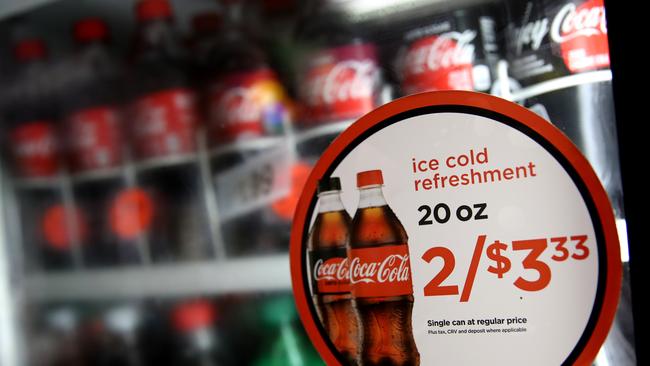
Dow Jones Newswires
5.20am: US stocks rise to records on stimulus bets
US stocks rose to record levels as lawmakers closed in on a deal to extend a new financial lifeline to businesses and individuals that could support the economy through the coronavirus pandemic’s deadliest phase.
All three major stock benchmarks hit intraday highs in early trading. The Dow Jones Industrial Average had in lunchtime trade added 125 points, or 0.4 per cent, to 30278, while the S&P 500 climbed 0.5 per cent. The Nasdaq Composite gained 0.6 per cent.
Congressional leaders closed in on a roughly $US900 billion coronavirus relief deal that includes another round of direct payments to households. After months of gridlock, the emerging agreement represented a breakthrough at a critical time in the pandemic, with vaccine distribution under way but hospitalisation hitting record highs.
Investors broadly think a new dose of stimulus is necessary to gird the economy until the end of winter and widespread vaccinations have the potential to bring the virus under control in 2021. Rising cases appear to have hit consumer sentiment, weighing on retail sales, and there are new business restrictions in some states.
“The stimulus is key,” said Mary Nicola, a portfolio manager at PineBridge Investments.
Labor-market data added to evidence that the economy has hit a speed bump. Initial claims for unemployment benefits rose by 23,000 to 885,000 in the week ended Dec. 12, whereas economists were expecting a small decline.
“Any stimulus is good stimulus at this point, especially when you’re coming through a rough patch,” Ms. Nicola added. “This will provide a bit more of a boost to the recovery.”
International markets also advanced Thursday. The regionwide Stoxx Europe 600 gained 0.3 per cent, led by shares in economically sensitive commodity producers and retailers alongside media companies. China’s Shanghai Composite Index ended 1.1 per cent higher. Japan’s Nikkei 225 ticked up 0.2 per cent.
Dow Jones Newswires
5.10am: US states file antitrust suit against Google
A coalition of 38 states filed an antitrust suit against Alphabet’s Google unit, alleging it maintained monopoly power over the internet-search market through anticompetitive contracts and conduct.
“As the gateway to the internet, Google has systematically degraded the ability of other companies to access consumers,” the states said in a wide-ranging complaint making allegations about Google’s search and advertising businesses.
Google couldn’t immediately be reached for comment. It has said it operates in competitive markets and its products benefit consumers.
The suit was the third recent government antitrust action against Google, following a Wednesday complaint from other states focused on Google’s digital advertising empire and an October 20 Justice Department suit also targeting its search business.
Thursday’s suit added allegations not covered in detail in the other two complaints. The lawsuits could proceed separately or eventually join in a single case over what could be years of litigation.
Dow Jones
5.02am: Macquarie Infrastructure in fibre buys
Enel SpA said it has resolved to sell a minimum 40pc stake and up to 50pc of Open Fiber SpA to Macquarie Infrastructure & Real Assets, part of Macquarie Group.
The sale of Enel’s 50pc stake would mean a sale of its entire stake in Open Fiber, it said.
The Rome-based energy company said the consideration for the sale of 50pc of Open Fiber equals 2.65 billion euros ($US3.23 billion) and includes the transfer to Macquarie Infrastructure of the totality of Enel’s portion of a shareholders’ loan granted to Open Fiber. That would have an estimated consideration of about EUR270 million as of June 30, 2021.
Should the sale be for 40pc of Open Fiber, the consideration for the sale would be EUR2.12 billion, the company said. Enel’s portion of the shareholders’ loan granted to Open Fiber and transferred to Macquarie Infrastructure would be equal to 80pc and would have an estimated value of around EUR220 million as of June 30, 2021.
The transaction is expected to be finalised by June 30, 2021.
Dow Jones Newswires
5.00am: Global markets mark time
Stock markets marked time as investors kept one eye on US stimulus progress and the rollout of vaccines and the other on surging infections and new lockdowns.
The pound kept at around 19-month highs against the dollar as the Bank of England held fire over interest rates and stimulus as Britain and the EU continue their 11th-hour talks on their post-Brexit trading arrangement.
The strengthened pound weighed on London’s benchmark FTSE 100 stocks index featuring multinationals’ earnings in dollars.
Eurozone equity indices climbed modestly after gains across much of Asia, although Germany’s DAX eyed a fresh push towards its record close of 13,800 seen in February before it collided with a Covid-induced loss of lustre.
London closed down 0.3 per cent, Frankfurt rose 0.8 per cent and Paris closed flat.
Wall Street was steady as she goes with the Dow adding just 0.4 per cent mid-session while the dollar was struggling after a Federal Reserve update.
Bitcoin extended gains to a fresh record above $US23,000, hovering around the $US23,500 mark for a 13 per cent rise over 24 hours.
“Markets overall are still in a positive frame of mind, managing to find the good news in an otherwise dull Fed statement and looking forward to some progress on a US stimulus deal, the major narrative behind this market bounce,” said Chris Beauchamp, chief market analyst at IG trading group.
AFP
4.58am: Huawei to open factory in France
Huawei said it would open a manufacturing facility for mobile phone network equipment in France, the first of its kind outside of China.
At least 200 million euros ($US245 million) will be invested to get the facility in the eastern town of Brumath up and running, creating 300 jobs initially.
Located near the border with Germany, the site aims to produce 1 billion euros of equipment per year for the European market.
“With this factory built at the crossroads of Europe, Huawei will enrich its already rich presence on the continent with 23 research and development centres, more than 100 partner universities, more than 3,100 suppliers and an effective supply chain,” the company said in a statement.
The announcement comes as the Chinese telecoms giant is under pressure both from accusations by the US that its mobile network equipment is a spying risk as well as charges it has assisted efforts by Beijing to monitor Uighur Muslims.
Huawei has rejected accusations by Washington that Beijing could access its equipment to snoop on voice and data traffic, but an increasing number of countries including France have restricted if not outright banned Huawei equipment from their 5G mobile networks.
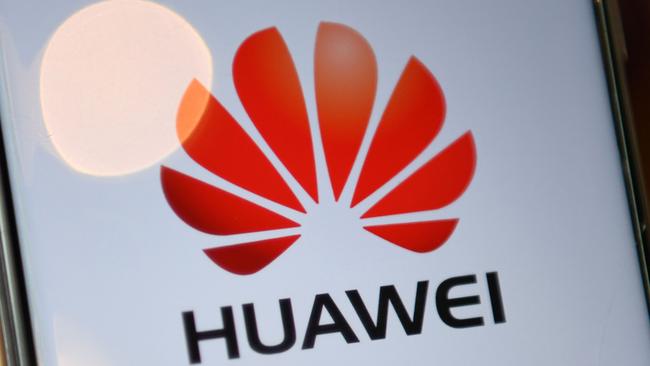
AFP
4.55am: Robinhood fined $US65m for misleading customers
Robinhood will pay $US65 million to settle charges it misled customers over payments from trading firms that overcharged users to execute transactions, US securities regulators said.
In exchange for the payments, Robinhood routed orders to these firms, resulting in $US34.1 million in higher customer fees, the Securities and Exchange Commission said in an order that faults the firm’s statements to customers between 2015 and late 2018.
A trading app that has soared in popularity during the pandemic, Robinhood has touted the lack of trading commissions in customer communications.
“Robinhood provided misleading information to customers about the true costs of choosing to trade with the firm,” said SEC enforcement chief Stephanie Avakian.
“Brokerage firms cannot mislead customers about order execution quality.” Robinhood said it has improved its customer disclosures and trading execution processes compared with the period discussed in the SEC order.
“The settlement relates to historical practices that do not reflect Robinhood today,” said Robinhood Chief Legal Officer Dan Gallagher. “We recognise the responsibility that comes with having helped millions of investors make their first investments, and we’re committed to continuing to evolve Robinhood as we grow to meet our customers’ needs.” Robinhood agreed to pay the penalty without admitting or denying the findings. The company also agreed to retain a consultant to review its processes, including customer communications.

AFP
4.50am: US jobless claims rise again
New applications for US jobless benefits increased for the second week in a row, according to government data, with 885,000 applications submitted last week.
The increase was much worse than expected and 23,000 above the previous week’s upwardly revised level, the Labor Department reported.
The fourth gain in the past five weeks indicates lay-offs continues amid ongoing negotiation in Congress on a new stimulus package to aid the economy’s recovery from the coronavirus pandemic.
AFP
4.45am: EU conditionally approves Google acquisition of Fitbit
The European Union approved Google’s $US2.1 billion purchase of smartwatch maker Fitbit, after the tech titan agreed to conditions including not using health data from European users for advertising.
“We can approve the proposed acquisition of Fitbit by Google because the commitments will ensure that the market for wearables and the nascent digital health space will remain open and competitive,” EU competition chief Margrethe Vestager said, in a statement.
AFP
4.40am: BoE sits tight awaiting Brexit deal outcome
The Bank of England kept its key interest rate at a record-low 0.1 per cent and maintained the huge amount of cash stimulus it has been pumping around the economy.
Following its final monetary policy meeting before the end of the Brexit transition period on December 31, the BoE said it stands ready to carry out “whatever additional action is necessary” as the coronavirus pandemic slashes economic growth.
The central bank said the start of vaccine rollouts “is likely to reduce the downside risks to the economic outlook from Covid”.
“Financial markets worldwide, and some surveys of businesses and consumers, have reacted positively to these developments which are likely to support future UK and global activity,” it added in minutes of its regular meeting held on Wednesday.
The bank has pumped out £450 billion under its QE -- Quantitative Easing -- stimulus program since March, when COVID-19 prompted Britain’s first coronavirus lockdown.
The pandemic led the BoE to also slash its main interest rate to 0.1 per cent. Prior to this, it pumped hundreds of billions of pounds into the UK economy over the past decade in the wake of the 2008-09 global financial crisis and the 2016 Brexit referendum.
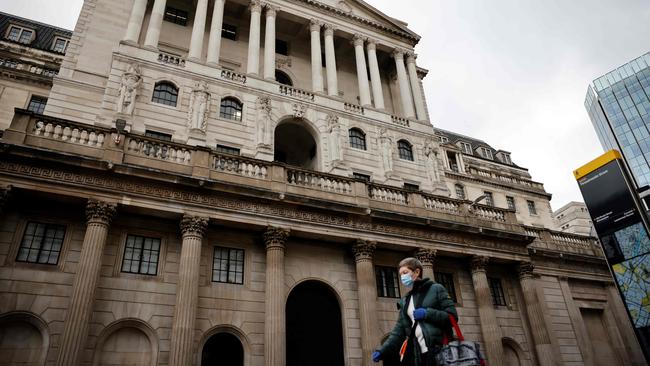
AFP




To join the conversation, please log in. Don't have an account? Register
Join the conversation, you are commenting as Logout